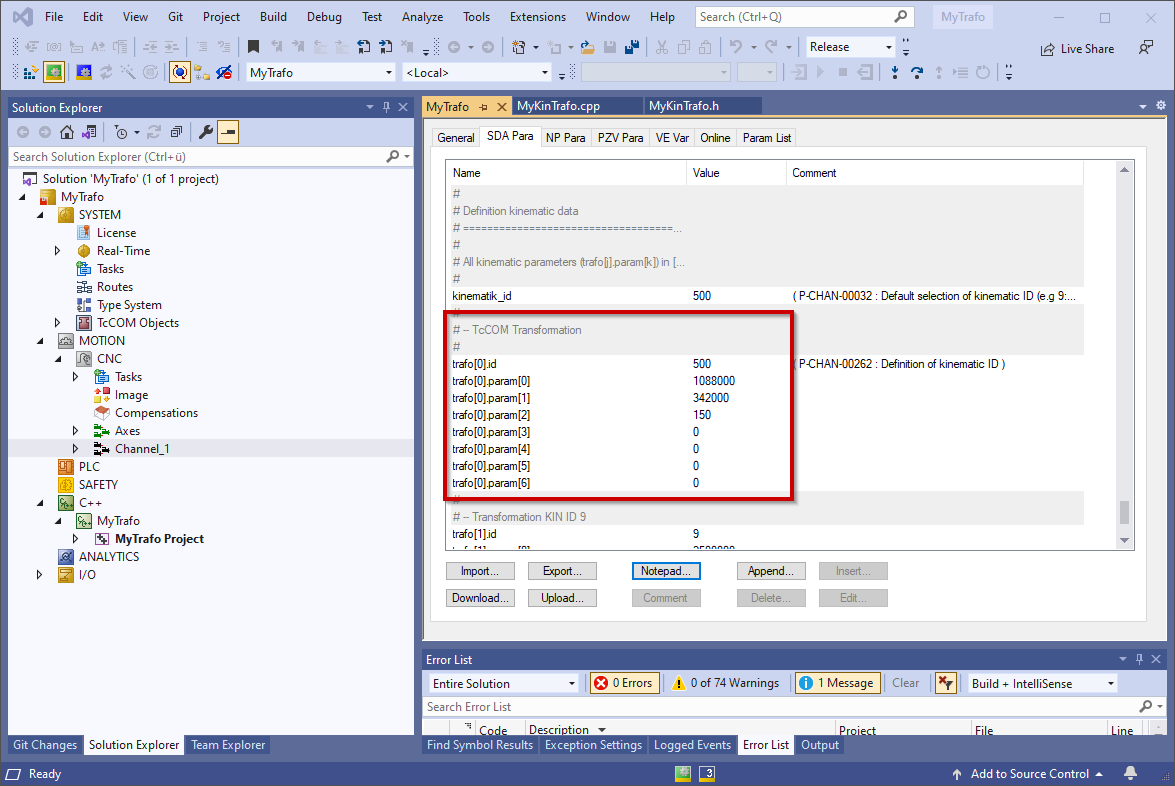Channel parameter
Example

Channel parameterisation example
# Define the standard transformation
kinematik_id 500 ( P-CHAN-00032)
# ---------------------------------------------
# -- TcCOM Transformation
#
trafo[0].id 500 ( P-CHAN-00262 )
trafo[0].param[0] 1088000 ( P-CHAN-00263 )
trafo[0].param[1] 342000
trafo[0].param[2] 150
trafo[0].param[3] 0
trafo[0].param[4] 0
trafo[0].param[5] 0
trafo[0].param[6] 0
#
trafo[1].id 9
trafo[1].param[0] 120000
trafo[1].param[1] 100000
trafo[1].param[2] 120
trafo[1].param[3] 0
trafo[1].param[4] 0

Description of channel parameters
P-CHAN-00032 | Select kinematic default transformation (kinematic type) |
Description | The purpose of kinematic ID is to identify the machine or tool head specific kinematic types implemented in the controller. This parameter defines the default setting for the kinematic transformation to be used. |
Parameter | kinematik_id |
Data type | UNS16 |
Data range | 1 ≤ kinematik_id < 1000 |
Dimension | ---- |
Default value | 0 |
Remarks | Parameterisation example: kinematik_id 2 For more details on machine kinematics see [KITRA] and [PROG]. |
P-CHAN-00262 | Define kinematic ID for transformations |
Description | The kinematic ID identifies the related transformation as an element of the data set of kinematic parameters. The definition can be made for single-step, multi-step and PCS transformations. |
Parameter | trafo[j].id kin_step[i].trafo[j].id (multi-step transformations) trafo_pcs[i].id (PCS transformation *) |
Data type | UNS16 |
Data range | 1 ... MAX(UNS16) |
Dimension | ---- |
Default value | 0 |
Remarks | Parameter syntax as of V300 and higher *The PCS transformation function is available as of V3.1.3110. |
P-CHAN-00263 | Define kinematic parameters for multi-step transformations |
Description | The specific kinematic offsets are entered in this structure for each transformation. You can specify offsets for single-level, multilevel transformations and PCS transformations. |
Parameter | trafo[j].param[k] or where k = 0 to 73 (maximum number of kinematic parameters) kin_step[i].trafo[j].param[k] (multi-step transformations) trafo_pcs[i].param[k] (PCS transformation *) |
Data type | REAL64 |
Data range | ---- |
Dimension | 0.1 µm or 0.0001 inch |
Default value | 0 |
Remarks | Kinematic parameters can also be entered in the tool data list P-TOOL-00009 (they are then relevant only when a tool is selected, independent of the kinematics). If a kinematic parameter is assigned in both lists, the specified values are added in the NC. This is only valid for transformation step 1. No additional kinematic parameters can be entered in the tool data for transformation step 2. For further details on the parameterisation of a kinematic transformation, see [KITRA] and [PROG]. (Parameter syntax as of V300) *The PCS transformation function is available as of V3.1.3110. |
P-CHAN-00829 | Kinematic type for transformations |
Description | This parameter defines the kinematic type. The definition can be made for single-step, multi-step and PCS transformations. |
Parameter | trafo[j].type kin_step[i].trafo[j].type (multi-step transformations) trafo_pcs[i].type (PCS transformation *) |
Data type | UNS16 |
Data range | 0 ... MAX(UNS16) |
Dimension | --- |
Default value | 0 |
Remarks | When a kinematic ID (P-CHAN-00262) is configured unequal to 0 and the kinematic type is 0, the value of the kinematic ID is assigned to the kinematic type. Available as of V3.1.3080.09 * The PCS transformation function is available as of V3.1.3110. |